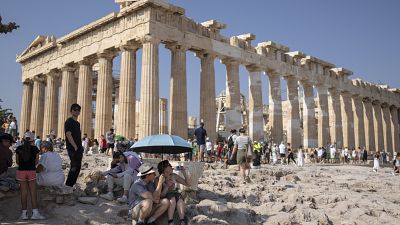Visitor numbers to the attraction were up 70 per cent last month, giving a taste of what is to come this summer without crowd control.
The Acropolis can’t help but stir a sense of wonder in visitors.
But when Caroline Kutek visited the renowned archaeological site in Athens recently, she struggled to overlook the crowds.
"The wait and the amount of people that are here are definitely overwhelming,” said the 30-year-old customer services operator from the US.
She stood in sight of hundreds of people queuing on the uphill path to the 2,500-year-old monument, an all too common sight.
Australian sales assistant Jackie Zachary admitted that she didn't expect such a high volume of tourists in June and believed July would be busier.
According to the Greek state organisation for the management of cultural resources (ODAP), the Acropolis received a staggering 14,000 visitors in May, a 70 per cent increase compared to 2022.
ODAP chairman Ilias Patsarouhas noted that daily visits from April onwards matched the levels seen in August, traditionally the busiest month for Greek tourism.
Why is the Acropolis so busy?
As the world sees a resurgence in demand for leisure travel, tourist numbers in Greece are approaching pre-pandemic levels.
This, coupled with an earlier start to the tourist season, has exacerbated the issue.
Even with an online "fast pass," Kutek and her family had to wait approximately 15 minutes to enter.
Kutek described the top of the Acropolis as the worst part, where people had to funnel into a single line, resulting in the separation of groups.
World Heritage Watch, a non-governmental organisation supporting UNESCO, expressed concern that the Acropolis lacks visitor management plans required by the UN World Heritage Convention, to which Greece is a signatory.
Stephan Doempke, the chair of World Heritage Watch, emphasised the long-standing issue of "over-tourism" at the site, stating that without a management plan and understanding of how to handle tourists, the Acropolis, a globally significant site, is at risk.
Congestion at the Propylaea, the gateway to the sanctuary, occasionally becomes so severe that security guards have to intervene, according to Patsarouhas.
The situation worsens when cruise ships dock at the port of Piraeus, resulting in an influx of two to three thousand passengers and wait times exceeding an hour.
Ioannis Mavrikopoulos, a veteran guard at the Acropolis, highlighted the chronic lack of staff at archaeological sites across the country, particularly on Greek islands where conditions are described as "dramatic."
How is Greece tackling overtourism at the Acropolis?
The Greek Ministry of Culture approved controversial restoration work at the Acropolis two years ago, which included the construction of a new concrete walkway.
The ministry defended the redesign, claiming it improved wheelchair accessibility and reduced accident risks. However, Doempke criticised the upgrades, suggesting they aimed at increasing tourist numbers and were therefore "totally irresponsible."
To address overcrowding, the ministry plans to introduce a time slot system gradually by the end of June.
However, site guards argue that implementing the new system during the mid-season is a mistake that will further burden their work.
Mavrikopoulos recommended that any changes be implemented after the tourism season.
With Greece relying on tourism to revive its economy after the decade-long debt crisis, officials hope to surpass the record-breaking 31.3 million arrivals recorded in 2019.



